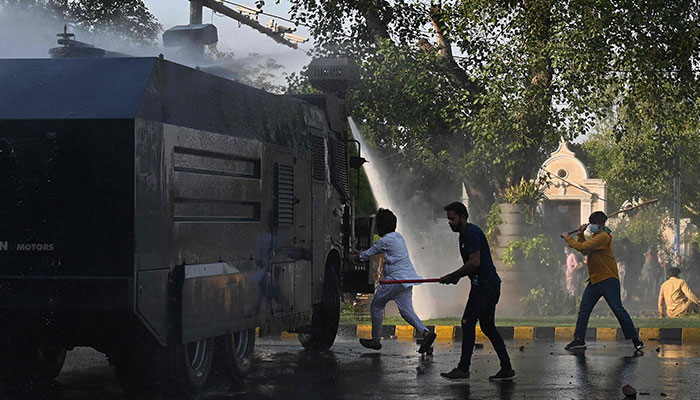How May 9 attacks attract Army Act, Official Secrets Act
Sources say military authorities do not need permission from govt to try those who have committed offences under these two acts
ISLAMABAD: Attack on military installations, buildings etc., even by civilians, is an offence under the Pakistan Army Act of 1952, which interestingly also covers offences including entering into prohibited places under the Official Secrets Act 1923.
Government sources said that for the same reason, the military courts will try the planners, instigators and attackers of defence installations, buildings, monuments etc on May 9 under Army Act 1952 and Official Secrets Act 1923.
These sources said that the military authorities do not even need permission or approval from the federal government to try those who have committed offences under these two acts. The existing military courts under Army Act are part of the country’s judicial system and many civilian accused have been tried under the same act, claim these sources. It is said that Section 2(d) of the Pakistan Army Act 1952 covers the application of this law on those who are not part of the defence forces. The said section is quite detailed and shows that persons, who are not otherwise subject to this act, shall be subject to this act if they are accused of having committed, in relation to any work of defence, arsenal, naval, military or air force establishment or station, ship or aircraft or otherwise in relation to the naval, military or air force affairs of Pakistan, an offence under the Official Secrets Act, 1923. The Act also covers the act of attacking military installations. The Army Act, as mentioned in the above para, also covers those who commit an offence under the Official Secrets Act.
Reading of the Official Secrets Act 1923, which envisages different types of offences, shows that the act will come into action if any person for any purpose prejudicial to the safety or interests of the state approaches, inspects, passes over or is in the vicinity of, or enters any prohibited place. Such an offender can be sentenced to imprisonment for a term which may extend to 14 years.
The special corps commanders’ conference, which met last week and was presided over by Chief of Army Staff General Asim Munir at GHQ, had decided that those involved in attacks on military installations, personnel and equipment during violence on May 9, would be tried under relevant laws of Pakistan Army including Pakistan Army Act and Official Secrets Act. The announcement to try planners, instigators, abettors and attackers of military installations, buildings, etc on May 9 under the Army Act and Official Secrets Act generated debate in the media and political circles over the validity of such a decision. Some people argue that it would be a violation of the Constitution, others mix up the Army Act with certain legislations done in the past for military courts.
-
 Czech Republic Supports Social Media Ban For Under-15
Czech Republic Supports Social Media Ban For Under-15 -
 Prince William Ready To End 'shielding' Of ‘disgraced’ Andrew Amid Epstein Scandal
Prince William Ready To End 'shielding' Of ‘disgraced’ Andrew Amid Epstein Scandal -
 Chris Hemsworth Hailed By Halle Berry For Sweet Gesture
Chris Hemsworth Hailed By Halle Berry For Sweet Gesture -
 Blac Chyna Reveals Her New Approach To Love, Healing After Recent Heartbreak
Blac Chyna Reveals Her New Approach To Love, Healing After Recent Heartbreak -
 Royal Family's Approach To Deal With Andrew Finally Revealed
Royal Family's Approach To Deal With Andrew Finally Revealed -
 Super Bowl Weekend Deals Blow To 'Melania' Documentary's Box Office
Super Bowl Weekend Deals Blow To 'Melania' Documentary's Box Office -
 Meghan Markle Shares Glitzy Clips From Fifteen Percent Pledge Gala
Meghan Markle Shares Glitzy Clips From Fifteen Percent Pledge Gala -
 Melissa Jon Hart Explains Rare Reason Behind Not Revisting Old Roles
Melissa Jon Hart Explains Rare Reason Behind Not Revisting Old Roles -
 Meghan Markle Eyeing On ‘Queen’ As Ultimate Goal
Meghan Markle Eyeing On ‘Queen’ As Ultimate Goal -
 Japan Elects Takaichi As First Woman Prime Minister After Sweeping Vote
Japan Elects Takaichi As First Woman Prime Minister After Sweeping Vote -
 Kate Middleton Insists She Would Never Undermine Queen Camilla
Kate Middleton Insists She Would Never Undermine Queen Camilla -
 King Charles 'terrified' Andrew's Scandal Will End His Reign
King Charles 'terrified' Andrew's Scandal Will End His Reign -
 Winter Olympics 2026: Lindsey Vonn’s Olympic Comeback Ends In Devastating Downhill Crash
Winter Olympics 2026: Lindsey Vonn’s Olympic Comeback Ends In Devastating Downhill Crash -
 Adrien Brody Opens Up About His Football Fandom Amid '2026 Super Bowl'
Adrien Brody Opens Up About His Football Fandom Amid '2026 Super Bowl' -
 Barbra Streisand's Obsession With Cloning Revealed
Barbra Streisand's Obsession With Cloning Revealed -
 What Did Olivia Colman Tell Her Husband About Her Gender?
What Did Olivia Colman Tell Her Husband About Her Gender?




